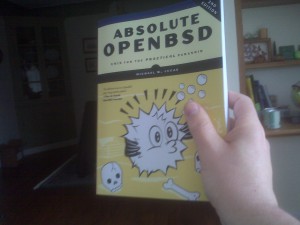One of the tasks on an author’s to-do list is gathering blurbs for the new book. A blurb is blatant promotion from a name a reader might recognize. Preferably a name that has some bearing on the topic of the book. You frequently see this in fiction, where the first couple of pages are other people saying “this book is fantastic! It cured my leprous bulemia!” Most often it’s multiple authors each saying nice things about the others’ books.
“Nice,” I think. “They’re doing each other favors. It’s blatant backscratching. When I’m successful, I swear I will never do that.”
For the first time, the fine folks at No Starch Press asked me to get blurbs for the new book. Apparently I have reached the point where I merit that. It’s not bad enough that going around asking people to praise me is like begging for approval. No, I’m a computer dork. Telling others about my accomplishments doesn’t come naturally, and doesn’t work well when I try. Apparently this is common.
(For the record, I don’t particularly like bacon. Pig, yes, but bacon, not so much. I’m aware this is heresy on the Internet. Deal.)
So I have my mission: get blurbs. I think about who I know, who might be interested in the book. With growing horror, I realize: most of them are writers. All of them are friends on some scale, somewhere on the spectrum from “call up when you’re in town and we’ll get gelato” to “I heard you need to borrow a kidney, my back is already shaved.”
I guess I’m going back on my younger and dumber self’s sworn word. Dammit.
At least they all wanted to see the book before they said nice things about it. That’s mild balm to my conscience.
So, I’ve gotten a couple of them back and felt like sharing them. Actually, no, I misspeak. I don’t feel like sharing them. But if something embarrassing is going to happen, it’s best to take control and get it over with. So, in that spirit:
From George Rosamond, a founding member of NYC*BSD User Group and noted detester of string beans and beets:
“The space for BSD books is small, indeed.
All the BSDs provide excellent documentation, from their handbooks and FAQs to their native manual pages. Got a question? There’s a good chance you will find the answer in the official documentation.
Michael W. Lucas manages to squeeze into that ‘other’ space. He engages the reader. He answers those specific questions and addresses those methods that a manual page or online documentation can’t approach.
He is the modest sysadmin sitting next to you in front of an OpenBSD box, narrating as you dive into an operating system that does things minimally without fuss. He’s not perched up high on a pedestal, preaching or obfuscating his words. He is a layperson’s tutor, who’s working through the same issues the average sysadmin does.
So buy this book. Buy it because for the amateur or intermediate OpenBSD end-user, you will flatten any learning curves real or perceived. You will find the elegant simplicity of OpenBSD, while sometimes discouraging for the uninitiated user, is a fruitful path for building systems that just run.”
And from Chris Sanders, author of the essential Practical Packet Analysis and better human being than I am:
“It’s rare to find a book that can cover so much technical content while still being engaging and enjoyable to read. Absolute OpenBSD, 2nd edition, is one of those books that achieves that with flare. Whether you are an experienced OpenBSD user seeking a functional desk reference, or a new OpenBSD user seeking to gain the carnal knowledge necessary to become an expert, then Absolute OpenBSD is the book you have to have.”
Somehow, I don’t think NSP will let me use those blurber descriptions, though. Pity.
[UPDATE] Oh, yes, the plug. Forgot the plug. Preorder Absolute OpenBSD, 2nd Edition. Get ebook and print together for one low price. Use coupon code ILUVMICHAEL for a 30% discount and give me a couple extra bucks. Or, if you’re in a place where shipping from the US is prohibitive, get it locally. Whatever. In either case, thank you.
 The fine folks at No Starch Press did a beautiful job designing and creating the print book. I know ebooks are the coming thing, but a well-designed physical book is a delight.
The fine folks at No Starch Press did a beautiful job designing and creating the print book. I know ebooks are the coming thing, but a well-designed physical book is a delight.